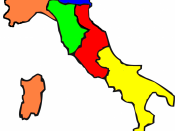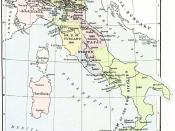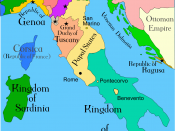Since the fall of the Roman Empire in the fifth century the Italian peninsular had not been a unified political power instead it comprised of partitioned powers known as city states and papal states. Between the fifteenth and eighteenth century 'Italy' was plagued by foreign domination.
The concept for the desire of an Italian national identity can be traced back far to the seventeenth and eighteenth centuries. Both Machiavelli and Dante envisaged 'Italia' as a cultural nationalist expression. S. Battilini, Carlo Denina also wrote in terms of an Italian identity.
However, the period described as the 'Risorgimento' (meaning revival or new-birth) can be said to have started in 1815 with the ending of Napoleon's reign and the Congress of Vienna. The settlements that had been reached in the Congress of Vienna restored Austrian domination. However, it had left Italy fragmented. The congress divided the peninsula among European nations and victors of the Napoleonic wars into five principle states, being; Piedmont (including Sardinia, Nice and Savoy), Lombardy Venetia, Grand Duchy of Tuscany, Papal and Kingdom of Naples.
Italy therefore merely reflected the interests of the victorious European Powers.
One legacy of Napoleonic government had been the introduction of liberalism through his modern and efficient mode of government known as Code Napoleon. Liberalism is difficult to define it is a political philosophy which, inspired by the ideas of the French revolution, deemed freedom of thought and speech, freedom from arrest and imprisonment without trial as among the most important rights of man. In addition parliamentary government was a better form of government than an absolute monarchy. In short it laid emphasis on the importance of individual freedom and on the limitation of the power of rulers by an elected assembly.
On the whole there was no great demand among Italians for...


